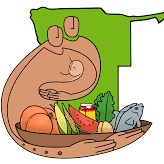It's time to set up a regional food security alliance
HM Sabbir Hossain [Source : Daily Observer, 20 May 2025]

The idea of food security in Bangladesh is not just about ensuring that food is available-it is deeply intertwined with politics, planning, and climate realities. Understanding this requires looking back at critical turning points. One such moment came in 2007. That year, Bangladesh faced two major climate shocks: Cyclone Sidr devastated the south while severe flooding hit the north. Crops were wiped out across vast regions. The caretaker government, desperate to stabilize rice supply, turned to India, which initially agreed to sell 500,000 tons of rice. However, delays in shipment led to deeper troubles. This wasn't a case of Bangladesh requesting aid-it was ready to pay. Yet bureaucratic hurdles and Indian internal concerns delayed the delivery.
To make matters worse, just as Bangladesh began replanting seedlings, upstream water released from India flooded low-lying fields again, destroying newly planted seedlings. As food prices rose, especially for rice-the staple for most Bangladeshis-public frustration mounted. Government crackdowns on business activities, intended to curb hoarding and profiteering, further disrupted market flows. The combined impact of climate, external dependency, and poor crisis management created a situation that many still remember as a wake-up call.
A decade later, in 2017, a series of flash floods across the haor (wetland) areas again damaged crops. Like 2007, it revealed the fragility of Bangladesh's food system, especially under the pressure of climate events and import delays. These moments from the past underscore a central point: food security in Bangladesh is as much a geopolitical and economic issue as it is an agricultural one.
India has historically been Bangladesh's largest and most accessible food import source. However, this convenience has often come at the cost of vulnerability. In critical moments-like 2007 or during India's repeated export bans on onions and wheat-Bangladesh has found itself cornered. The strategic lesson is clear: over-dependence on a single partner for essential commodities is a risk Bangladesh can no longer afford to take.
In 2017, a series of flash floods across the haor (wetland) areas again damaged crops. Like 2007, it revealed the fragility of Bangladesh's food system, especially under the pressure of climate events and import delays
Additionally, contract farming beyond borders is a forward-looking strategy Bangladesh must seriously explore. Countries like Myanmar and some African nations offer fertile land and the possibility of surplus production. Given Bangladesh's extensive experience with agricultural innovations-especially in rice and jute-it can engage in technology-for-access diplomacy. By providing farming technology, Bangladeshi firms or public-private partnerships can secure rights to a portion of the yield in return. Off-country farming, however, must be pursued with careful diplomatic negotiation and legal safeguards to protect investment and ensure supply reliability.
Technology can transform the food supply chain by boosting transparency through a government-backed digital platform that tracks supply, purchases, and prices. Redirecting just 5% of agricultural subsidies could incentivize farmers and buyers to use it, with verified transactions earning small cash rewards. Real-time data would help prevent shortages, curb manipulation, and improve storage decisions.
Another vital step is the introduction of a Minimum Support Price (MSP) based on actual production costs. This would create a floor price below which farmers are not forced to sell. If market prices fall below MSP, the government can procure and store grains for emergencies. This not only supports farmers but also helps build up strategic stockpiles. A flexible MSP policy, adjusted regionally and crop-wise, would ensure fairness while avoiding distortion.
Lastly, Bangladesh must invest in food diplomacy. Participation in multilateral forums like the WTO's Committee on Agriculture or regional bodies such as BIMSTEC must focus not only on trade rights but on securing food access during global supply shocks. Bangladesh should push for legally binding clauses in trade agreements that prevent abrupt export bans on food, especially from close allies.
In an era of climate change, global instability, and rising inequality, food security is national security. Bangladesh must act now-decisively, strategically, and multilaterally-to prevent the next crisis from becoming a catastrophe.
The writer is a student of International Relations, University of Chittagong